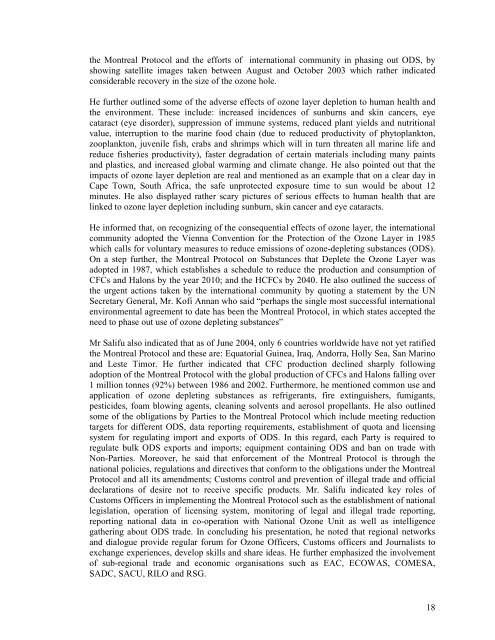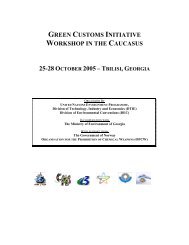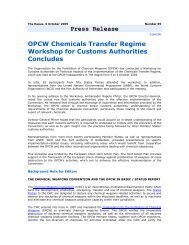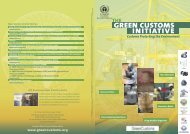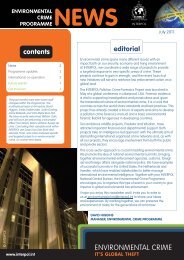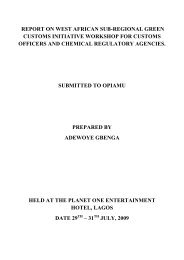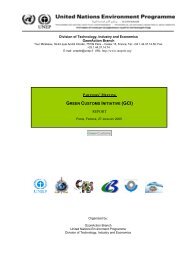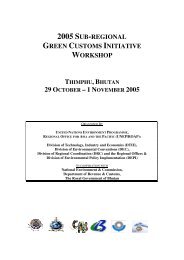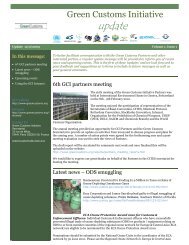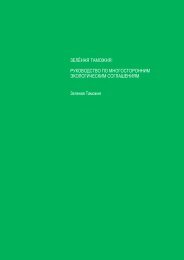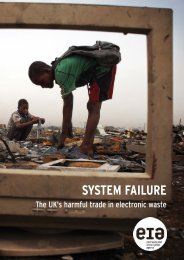Arusha - Green Customs Initiative
Arusha - Green Customs Initiative
Arusha - Green Customs Initiative
You also want an ePaper? Increase the reach of your titles
YUMPU automatically turns print PDFs into web optimized ePapers that Google loves.
the Montreal Protocol and the efforts of international community in phasing out ODS, by<br />
showing satellite images taken between August and October 2003 which rather indicated<br />
considerable recovery in the size of the ozone hole.<br />
He further outlined some of the adverse effects of ozone layer depletion to human health and<br />
the environment. These include: increased incidences of sunburns and skin cancers, eye<br />
cataract (eye disorder), suppression of immune systems, reduced plant yields and nutritional<br />
value, interruption to the marine food chain (due to reduced productivity of phytoplankton,<br />
zooplankton, juvenile fish, crabs and shrimps which will in turn threaten all marine life and<br />
reduce fisheries productivity), faster degradation of certain materials including many paints<br />
and plastics, and increased global warming and climate change. He also pointed out that the<br />
impacts of ozone layer depletion are real and mentioned as an example that on a clear day in<br />
Cape Town, South Africa, the safe unprotected exposure time to sun would be about 12<br />
minutes. He also displayed rather scary pictures of serious effects to human health that are<br />
linked to ozone layer depletion including sunburn, skin cancer and eye cataracts.<br />
He informed that, on recognizing of the consequential effects of ozone layer, the international<br />
community adopted the Vienna Convention for the Protection of the Ozone Layer in 1985<br />
which calls for voluntary measures to reduce emissions of ozone-depleting substances (ODS).<br />
On a step further, the Montreal Protocol on Substances that Deplete the Ozone Layer was<br />
adopted in 1987, which establishes a schedule to reduce the production and consumption of<br />
CFCs and Halons by the year 2010; and the HCFCs by 2040. He also outlined the success of<br />
the urgent actions taken by the international community by quoting a statement by the UN<br />
Secretary General, Mr. Kofi Annan who said “perhaps the single most successful international<br />
environmental agreement to date has been the Montreal Protocol, in which states accepted the<br />
need to phase out use of ozone depleting substances”<br />
Mr Salifu also indicated that as of June 2004, only 6 countries worldwide have not yet ratified<br />
the Montreal Protocol and these are: Equatorial Guinea, Iraq, Andorra, Holly Sea, San Marino<br />
and Leste Timor. He further indicated that CFC production declined sharply following<br />
adoption of the Montreal Protocol with the global production of CFCs and Halons falling over<br />
1 million tonnes (92%) between 1986 and 2002. Furthermore, he mentioned common use and<br />
application of ozone depleting substances as refrigerants, fire extinguishers, fumigants,<br />
pesticides, foam blowing agents, cleaning solvents and aerosol propellants. He also outlined<br />
some of the obligations by Parties to the Montreal Protocol which include meeting reduction<br />
targets for different ODS, data reporting requirements, establishment of quota and licensing<br />
system for regulating import and exports of ODS. In this regard, each Party is required to<br />
regulate bulk ODS exports and imports; equipment containing ODS and ban on trade with<br />
Non-Parties. Moreover, he said that enforcement of the Montreal Protocol is through the<br />
national policies, regulations and directives that conform to the obligations under the Montreal<br />
Protocol and all its amendments; <strong>Customs</strong> control and prevention of illegal trade and official<br />
declarations of desire not to receive specific products. Mr. Salifu indicated key roles of<br />
<strong>Customs</strong> Officers in implementing the Montreal Protocol such as the establishment of national<br />
legislation, operation of licensing system, monitoring of legal and illegal trade reporting,<br />
reporting national data in co-operation with National Ozone Unit as well as intelligence<br />
gathering about ODS trade. In concluding his presentation, he noted that regional networks<br />
and dialogue provide regular forum for Ozone Officers, <strong>Customs</strong> officers and Journalists to<br />
exchange experiences, develop skills and share ideas. He further emphasized the involvement<br />
of sub-regional trade and economic organisations such as EAC, ECOWAS, COMESA,<br />
SADC, SACU, RILO and RSG.<br />
18


